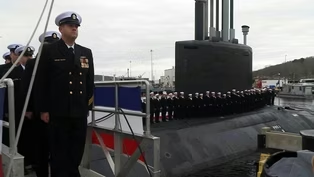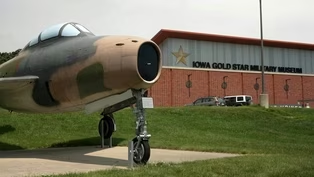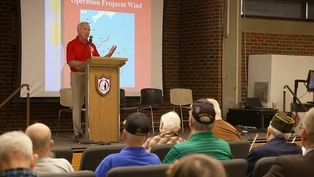
How Tri-State Women Warriors Empower and Support Women Who’ve Served
Clip: Season 3 Episode 305 | 3m 50sVideo has Closed Captions
The Tri-State Women Warriors connect and advocate for women veterans and service members.
Meet the Tri-State Women Warriors, a nonprofit devoted to supporting and advocating for women veterans and service members.
Problems playing video? | Closed Captioning Feedback
Problems playing video? | Closed Captioning Feedback
Iowa Life is a local public television program presented by Iowa PBS

How Tri-State Women Warriors Empower and Support Women Who’ve Served
Clip: Season 3 Episode 305 | 3m 50sVideo has Closed Captions
Meet the Tri-State Women Warriors, a nonprofit devoted to supporting and advocating for women veterans and service members.
Problems playing video? | Closed Captioning Feedback
How to Watch Iowa Life
Iowa Life is available to stream on pbs.org and the free PBS App, available on iPhone, Apple TV, Android TV, Android smartphones, Amazon Fire TV, Amazon Fire Tablet, Roku, Samsung Smart TV, and Vizio.
Providing Support for PBS.org
Learn Moreabout PBS online sponsorshipSchauer: The Tri-State Women Warriors is a nonprofit based in the tri-state area of Iowa, Illinois, and Wisconsin with a mission to provide connection and advocacy for the unique needs of women, veterans and service members.
I want your help.
We're all going to learn how to do this together.
Schauer: Today's event, we are doing mocktails and charcuterie.
There are a lot of different organizations that support veterans in this area.
To have an organization whose primary mission is to kind of organize and empower female veterans, it just adds that extra layer.
Schauer: When I really thought about the veteran groups in our area, they are -- they're incredible.
They do incredible things, but they are mostly men and often a different generation than I am.
I can't expect a man 30 years older than me to know, like, "Oh, I bet this, you know, 30-year-old woman here wants to do yoga [chuckles] or would like to, you know, have a planting day."
I am a veteran.
I served in the Army Reserves.
During that time, I was deployed to Baghdad, Iraq, as a combat medic.
I will openly say I struggled at first.
For a long time, even after that service, when I would look back on it, I would feel ashamed of how scared I was those first couple of months.
I usually start with grapes, and I place them just different places and then I... Schauer: It did impact me.
I didn't realize how much it impacted me until, like, now looking back on it.
[ Laughter ] Feeling invisible, not really feeling like a veteran, not really feeling like you have a place where you belong within the veteran community.
It's just hard to transition from the military to civilian life, and I kind of just isolated myself.
I served in both the Army and the Air Force, trained as a combat medic.
Schauer: There's a high rate of suicide in men and women veterans.
The gap between civilian and veteran is even wider for women.
Also, like, military sexual trauma plays into that a lot, which is something that we see in a lot of women veterans.
There are only about 800 women veterans in our tri-state area, and so the fact that now not only do I know, you know, hundreds of them, but now I know women who served at the same time I did in Iraq, which it might not sound like much, but to have that person that's had that same experience.
When you're in the military, it's not just a job.
It's also, like, part of your identity.
I was the psychologist for a group of about 3,500 soldiers.
We had a really active area of operations, in the time that I was deployed and in the area that I was in, so we did have some pretty heavy combat, and I was responsible for then meeting with groups of soldiers after they would go through something like that.
Veterans have a wide range of experiences, but they all were part of this close-knit community, kind of a brotherhood and a sisterhood.
And so leaving that can be, like, a real shock to the system.
[ Chuckles ] And so just kind of realizing that, I think, one of the things a lot of veterans struggle with is finding their purpose.
Gilstrap: Makes you feel whole again.
That piece that's missing when you leave the service, you are missing connection, camaraderie, all of that, your sense of purpose, sense of self.
You kind of try to figure it out.
And these ladies know exactly what you've been through.
Schauer: I'm hoping that because of us being out there in the community and -- and the visibility of our girls, That picture, that image that they have in their head of a veteran has changed.
So they're not surprised to learn somebody like me or any of these other girls are veterans.
And I'm just so thankful.
Like, I took myself out of isolation.
Now I'm back in the community and doing a ton of things and feel like myself.
Woman: Yeah.
[ Indistinct conversations ]
Inside the USS Iowa Submarine Commissioning and a Look at Navy Sub School
Video has Closed Captions
Clip: S3 Ep305 | 9m 47s | Inside the commissioning of the USS Iowa submarine and a look at Navy sub school. (9m 47s)
Preserving Iowa’s Military History at the Gold Star Museum in Johnston
Video has Closed Captions
Clip: S3 Ep305 | 4m 46s | The Iowa Gold Star Museum honors and preserves the stories of Iowa’s veterans. (4m 46s)
Retired Colonel Gerry Berry on the Flight That Ended America’s Involvement in Vietnam
Video has Closed Captions
Clip: S3 Ep305 | 7m 14s | Retired Colonel Gerry Berry shares his memoires of his final mission in Vietnam. (7m 14s)
Providing Support for PBS.org
Learn Moreabout PBS online sponsorshipSupport for PBS provided by:
Iowa Life is a local public television program presented by Iowa PBS
















